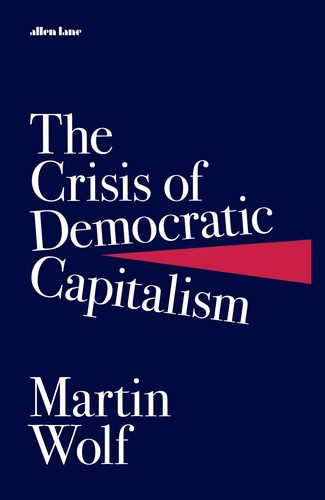When
Thursday, March 2nd from 2pm-3pm GMTWhere
Online via Zoom.Format
There'll be a "fireside" style chat with the author plus ample scope for discussion and debate.About the book
“From the chief economics commentator of the Financial Times, a magnificent reckoning with how and why the marriage between democracy and capitalism is coming undone, and what can be done to reverse this terrifying dynamic.
Martin Wolf has long been one of the wisest voices on global economic issues. He has rarely been called an optimist, yet he has never been as worried as he is today. Liberal democracy is in recession, and authoritarianism is on the rise. The ties that ought to bind open markets to free and fair elections are threatened, even in democracy’s heartlands, the United States and England.
Around the world, powerful voices argue that capitalism is better without democracy; others argue that democracy is better without capitalism. This book is a forceful rejoinder to both views. Even as it offers a deep, lucid assessment of why this marriage has grown so strained, it makes clear why a divorce of capitalism from democracy would be a calamity for the world. They need each other even if they find it hard to life together.
For all its flaws, argues Wolf, democratic capitalism remains far and away the best system for human flourishing. But something has gone seriously awry: the growth of prosperity has slowed, and the division of its fruits between the hypersuccessful few and the rest has become more unequal. The plutocrats have retreated to their bastions, where they pour scorn on government’s ability to invest in the public goods needed to foster opportunity and sustainability. But the incoming flood of autocracy will rise to overwhelm them, too, in the end.
Citizenship is not just a slogan or a romantic idea; it’s the only idea that can save us, Wolf argues. Nothing has ever harmonized political and economic freedom better than a shared faith in the common good.
This wise and rigorously fact-based exploration of the epic story of the dynamic between democracy and capitalism concludes with the lesson that our ideals and our interests not only should align, but must do so, for everyone’s sake. Democracy itself is now at stake.”
About the author

Martin Wolf CBE
Martin Wolf is Chief Economics Commentator at the Financial Times, London. He was awarded the CBE (Commander of the British Empire) in 2000. He was a member of the UK government’s Independent Commission on Banking between June 2010 and September 2011. He is an honorary fellow of Nuffield College, Oxford and King’s College, London. He has received honorary doctorates from six universities, including the London School of Economics. He is a University Global Fellow of Columbia University, New York. Mr Wolf won the Ludwig Erhard Prize for economic commentary for 2009, the 33rd Ischia International Journalism Prize in 2012, the Overseas Press Club of America’s prize for “best commentary on international news in any medium” for 2013 and the 2019 Lifetime Achievement Award at the Gerald Loeb Awards. His most recent publication is The Crisis of Democratic Capitalism (London and New York: Allen Lane, 2023).



